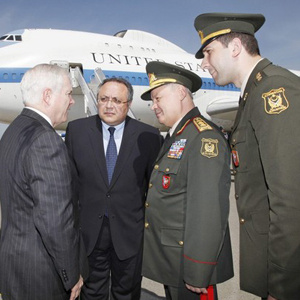Will Baku Host a U.S. Military Base?

What gained the attention the Kremlin-manipulated Russian media after Robert Gates’ June 6 visit to the Republic of Azerbaijan? Not his efforts to reassure the Azerbaijanis that they are still a key partner, or fortification of the Afghanistan supply chain, but the unverified reports that Washington intends to seal a deal to establish military bases in the Republic of Azerbaijan. The unpublicized letter from Barack Obama to Ilham Aliyev has fueled the rumor.
For some observers, a possible military contract will give the Republic of Azerbaijan leverage to wield in its relations with Iran. Along with this news, there are unverified reports of the U.S. and Russia deploying peacekeepers to Armenia-occupied Kalbajar Rayon, based on the Madrid Principles.
News of the U.S. aiming to establish a military base in the Republic of Azerbaijan has surfaced every so often since 9/11. And Washington is already using two radar stations installed in the northern and southern regions of Azerbaijan according to some observers. Baku, however, has reiterated that these stations are in control of its own military. Meanwhile, the Qabala Radar Station in Azerbaijan is currently operated by the Russians, who remain in control of the station until 2012.
The truth is that Azerbaijan makes no effort to keep a low profile on its cooperation with Washington. A number of Azerbaijani troops are already serving in Iraq and Afghanistan. And for Washington, Baku plays a key role as a transit route to supply NATO forces in Afghanistan.
However, Azerbaijan is not the only regional state hosting the U.S. military. Washington maintains several military bases in the Persian Gulf and the U.S. Navy patrol in Iran’s vicinity, to say nothing of the tens of thousands of soldiers it has dispatched to Iraq and Afghanistan since occupation. So why would it need a military base in the Republic of Azerbaijan?
Despite the United States’ absolute military superiority over all other countries, the quagmire in Afghanistan and Iraq prevent it from even thinking of a military attack on another Muslim country. The renewed attention given to diplomacy and economic pressures in Obama’s national security strategy, plus Iran’s military capabilities and its geopolitical status, oblige Washington and Tel Aviv to think twice before harboring the idea of physically attacking Iran. A likely negative reaction by the international community also gives them pause in formulating any plans to do so.
(Nevertheless, there is one unlikely possibility: that if the course of developments regarding Iran’s nuclear program turns against the will of West, the U.S, Israel and a number of global powers might decide to attack Iran using advanced technology –that is, without human intervention. The 205 million dollar additional budget asked for completion of the Israeli-developed Iron Dome technology -that intercepts short-range rockets- finds meaning in this context. Military deals between Western countries and the UAE and Saudi Arabia, plus rumors –later denied- about Riyadh allowing Israel to use its air corridor to attack Iran, also ring alarm bells.)
Moreover, Washington is cognizant of Moscow’s regional concerns, and hesitates in vexing the Kremlin by establishing a military base in its sphere of influence. During Obama’s presidency, Moscow and Washington have shifted to a policy of cooperation, which they seem to prefer to stiff competition. The developments in Kyrgyzstan and Georgia, Russia’s favorable vote on anti-Iranian sanctions in the UN Security Council, and the Moscow-NATO partnership attest to the new trend in Russia-U.S. ties.
Another question is, though, would the U.S. construct military bases in the Muslim Republic of Azerbaijan whose territory has been occupied by a Christian Armenia (and one shouldn’t forget the powerful Armenian lobby in Washington)? Americans must know that Baku could use the base in the future as leverage against Yerevan. There is a weak possibility, nonetheless, that Washington will strike a deal with Baku in order to help it regain Nagorno-Karabakh in return for a military base. However, the number of regional and global actors involved in the Nagorno-Karabakh dispute minimizes the chances for such a hypothetical deal.
The new military doctrine adopted by the Parliament of Azerbaijan, which approves using force to liberate Karabakh and gives a green light for the presence of extra-regional military forces, aims at special circumstances. The doctrine is in fact part of Baku’s psychological warfare against Yerevan and a pre-emptive measure against foreign threats. Weaker countries like Azerbaijan are in constant need of regional or global powers to guarantee their security (witness how Kyrgyzstan has now asked for Russia’s military help after the recent unrest in the country).
For the historical record, Iran and the Republic of Azerbaijan’s former presidents (Mohammad Khatami and Heydar Alyev) signed a cooperation agreement in the early 2000’s, according to which neither of the signatories will allow a third party use of their territory for a military attack on the other. A subsequent agreement signed by General Safar Abiof and his Iranian counterpart Admiral Shamkhani in 2005 underlines this agreement.
Tehran should not be influenced by the fuss the Russia media have created. The official stance of Iran’s northern neighbor will be determined by its leaders who have shown a preference to solve likely challenges based on historical, cultural, geopolitical, military, and security commonalities. The Russian media’s latest ballyhoo seems to be an attempt to divert attention away from the vote in favor that Moscow cast for the fourth round of sanctions against Iran.

